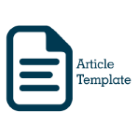CONTRIBUTION OF 21ST-CENTURY LEARNING SKILLS IN THE DEVELOPMENT OF ISLAMIC RELIGIOUS EDUCATION LEARNING AT MTSN 1 KLATEN DISTRICT
Abstract
The role of Islamic Religious Education (PAI) in the 21st century is facing various major obstacles, especially when connected with its contribution to the process of forming modern culture and character that is in line with developing technology and science. Therefore, a new approach is needed in the learning process, for example, an approach that focuses on students by applying various learning skills according to developments in the 21st century. This step is considered to be able to foster creative thinking abilities in students and increase the effectiveness of the teaching and learning process. This research aimed to discover and examine how 21st-century learning skills can contribute to developing PAI learning. This research is included in the type of library research with a qualitative approach. Library research itself is defined as an in-depth study of a topic in which the researcher attempts to collect, analyze, and then make a comparison between one expert opinion or manuscript and another opinion using a descriptive analysis method by analyzing its contents (content analysis). What is meant here is that the researcher tries to describe the actual condition of the subject or object of research according to the data he has collected. The results of the overall analysis carried out by researchers confirm that various types of 21st-century learning skills need to be developed. The first is communication skills which function very strategically because they can influence leadership abilities and the effectiveness of the knowledge transfer process to students. The second is collaboration skills which can improve the character of cooperation and solidarity among students. The third is critical thinking and problem solving (thinking critically and being able to solve problems) which can encourage students to be able to solve a particular problem regarding the subject matter. Fourth is creativity and innovation which can give rise to something innovative and creative in students. Meanwhile, the contribution of 21st-century learning skills to PAI lessons is that communication skills can grow students' ability to communicate with each other and with God, Allah SWT. Collaboration skills contribute to the ability to cooperate in realizing common goals. Furthermore, the contribution of critical thinking and problem-solving skills makes students able to investigate and analyze facts. Finally, creative and innovation skills contribute to students being able to come up with solutions and innovative concepts from a problem.
Keywords
Full Text:
PDFReferences
Deni Darmawan (2010), Learning Communication based on brain information and technology, Bandung: Humaniora,, p.99
Guide to Implementing 21st Century Skills in the 2013 Curriculum (2017), Directorate of High School, Middle School and Elementary School Development, Ministry of Education and Culture,
Lucy.B (2009), Educating according to children's interests and talents, Jakarta, p.5
Ministry of National Education (2003), National Education System Law, Jakarta, Ministry of National Education.
Hamzah B. Uno and Masri Kuadrat (2009), Managing Intelligence in Learning, Jakarta: Bumi Aksar, p. 2
Uno, HB (2011). Learning communication and information technology. STIK Library; Building Literacy. http://library.stik-ptik.ac.id
Sholeh, Abdul Rahman (2005). Religious Education and Development for the Nation. Jakarta: Raja Grafindo Persada,
Shah M (2000), Educational Psychology, Bandung: PT. Teen Rosdakarya, p.92
Djamarah S. B (2011), Psychology of Learning, Jakarta: Rineka Cipta, p.13
Sudjana N (1998), Basics of the Teaching and Learning Process, Bandung: Sinarbaru, p.28
Thobroni M and Mustofa A (2011), Learning and Learning: Development of discourse and learning practices in national development, Jogjakarta: Arruz Media, p.19
E. Mulyasa (2003), Competency Based Curriculum: Concept, Characteristics and Implementation, Bandung: PT Teen Rosdakarya, p.106
Abdul Majid (2013), Learning Strategies, Bandung: Teen Rosdakarya, p.4
E. Mulyasa (2012), Character Education Management, Jakarta: Bumi Aksara, p.129.
Mestika Zed (2004), Library Research Methods, Yogyakarta, Indonesian Obor Foundation, p. 3.
Nawawi H (1993), Social Research Methods, Yogyakarta, Gadjah Mada University Press, p. 31.
Johnson E. B (2009), Contextual Teaching and Learning, Ibn Setiawan Translated Edition. Bandung: MLC, pg 182
Fisher A (2009), Critical Thinking anIntroduction, Jakarta.: Erlangga, p. 2
Refbacks
- There are currently no refbacks.

This work is licensed under a Creative Commons Attribution-NonCommercial-NoDerivatives 4.0 International License.
This is an Open Access article distributed under the terms of the Creative Commons Attribution-NonCommercial-NoDerivatives 4.0 International (CC BY-NC-ND 4.0), permitting copy and redistribute the material in any medium or format.




